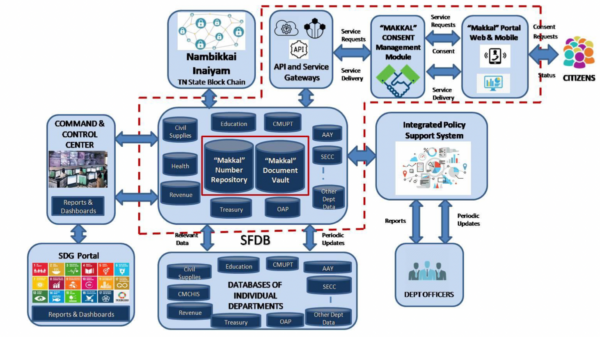The Tamil Nadu government is currently inviting bids for a partner to develop and deploy the State Family Database (SFDB), a mammoth e-governance project announced in January 2019. The project, which falls under the aegis of the Tamil Nadu e-Governance Agency (TNeGA), involves building a cross-departmental database of electronic records for all the citizens of the state.
An all-in-one database
SFDB is a data integration and exchange platform that is envisioned to be an all-in-one database used across different departments of the state government to maintain records of various kinds. For example, SFDB can be used by the Department of Revenue to maintain land records pertaining to a citizen and by the Department of Higher Education to maintain education records of the same citizen. Currently, fifteen state departments are expected to participate in this project and each can have its own application and associated database.
“The Government of Tamil Nadu and its various departments have embraced computerization and automation to conduct their day-to-day operations. Volumes of department data reside in different data platforms and technology stacks. The current data management architecture with multiple platforms create challenges in delivering efficient, transparent and seamless delivery of services to the residents of Tamil Nadu. The SFDB project, by enabling cross-department data harmonization and synchronization, will not only streamline government service delivery, but also assist the policy makers in making the right decisions providing data-driven policy making support.” – TNeGA Request for Proposal document
The SFDB will be the single source of truth on all details with respect to the state’s residents and the data it holds will is expected to be “the most current, relevant, complete, logically consistent, and comprehensive.”
Makkal Number – The element that ties everything together
The element that ties everything together in the SFDB is the Makkal Number (translates to people’s number): a unique number that the Government of Tamil Nadu has already allotted to nearly 7 crore citizens of the state. Each person’s records across various departmental databases within SFDB will be tied to the said person’s Makkal Number. Unlike Aadhaar, Makkal Number is not necessarily known to the citizen. Rather, it is used for consolidating records in the backend.
It is not clear when exactly the government started issuing Makkal Numbers but it appears to have stemmed from another e-governance project. Back in 2013, the Tamil Nadu government created the State Resident Data Hub (SRDH), later renamed Makkal, an e-governance project that sought to do many things that the new SFDB is now looking to do. But SRDH primarily used Aadhaar to deliver its services under the provisions granted by Section 57 of the Aadhaar Act, 2016. This section was struck down in 2018, although a separate amendment in 2019 allowed states to still use Aadhaar to a certain extent. About the same time, the Tamil Nadu government started issuing Makkal Number to its citizens. Back then a top official from the IT Department told Hindu that “The idea is to anonymise Aadhaar and provide a number to the citizens as it is fool-proof. This will be based on the consent of the individual.”
“The moment a child is born, a ‘Makkal Number’ (people’s number) is generated and assigned to the child. Under the initiative, when the child attains a certain age, for example, in the sixth month of birth, an SMS will be sent to the parents about the need to vaccinate the child, with details of the nearest vaccination centre. When the child turns five, the designated software will remind the parents to get him/her an independent Aadhaar number, and so forth.” – The Hindu
Although Makkal number will be used to tie together multiple records of citizens, the core SFDB database will first be built using the data available from Public Distribution System (PDS), which, in turn, uses Ration cards as the identifying document. Along with PDS data, data from seven other departments will form the core database and data from these departments will be matched to PDS data using Makkal Numbers.
What are the benefits of SFDB?
The Tamil Nadu government highlights the following purported benefits of this database:
- Data-driven decision making: The database is expected to help different state departments “harmonize and synchronize” their data, giving them a unified view and enabling them to find inter-departmental synergies and efficiencies in crafting and implementing policy. It will provide departments with dashboards and reports to achieve the same.
- Improving benefits transfer: The database will help in launching new schemes, identifying the poorest of poor, targeting vulnerable beneficiaries, in an accurate, reliable, and transparent manner. It will also improve service delivery and hold the government more accountable.
- Predictive service delivery: Rather than wait for citizens to request or avail themselves of a service they are eligible for, the government will proactively identify and deliver such services to citizens. Data from SFDB will play a crucial role in enabling such predictive service deliveries.
- Governance-as-a-Service model: The database will serve as a platform that enables the government to quickly and efficiently launch new services.
- Clean data: The selected system integration partner is expected to ensure that there is no duplicate data and that the system is able to handle variations in attributes like full name, father’s name, mother’s name, spouse’s name, address, on account for spelling mistakes, abbreviations, sequence variations, missing/extra parts, etc. Such issues are common in India and developing a solution to address them will yield high-quality, clean data.
- Monitoring Sustainable Development Goals (SDGs): The database will better help in planning and monitoring progress towards achieving UN’s SDGs.
Also Read
- Haryana’s Family ID Is An Aadhaar Redux, And A Massive Data Collection Exercise
- Health Ministry Permits ‘Voluntary’ Aadhaar Authentication For Creation Of Unique Health ID
- Supreme Court Dismisses Aadhaar Review Petitions, With Justice Chandrachud Dissenting
- Election Commission To Start E-KYC For Voter IDs, As Government Considers Linking Aadhaar To EPIC















